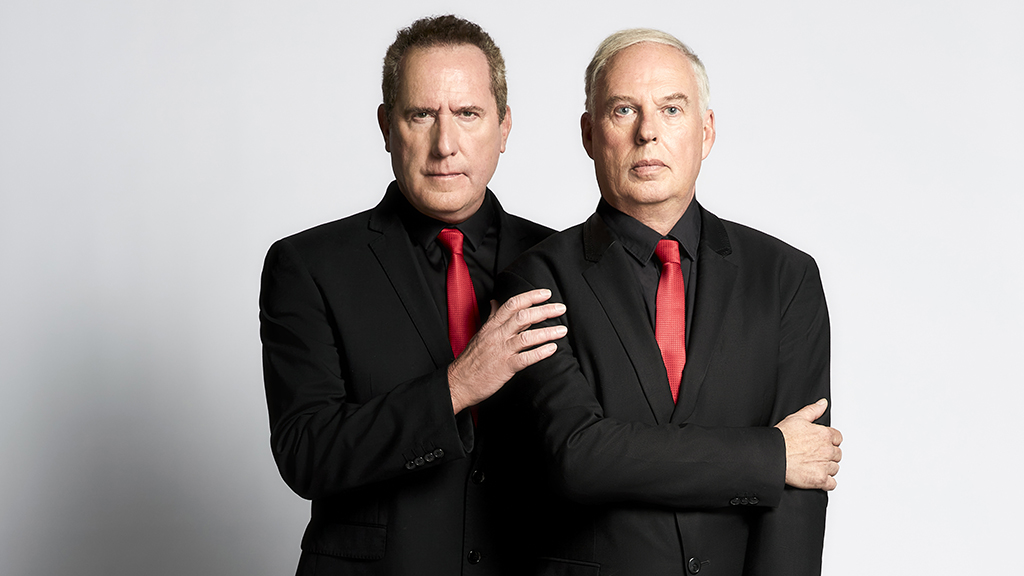
Our show with OMD at the Fox Theater – Oakland on September 15, 2024 has been rescheduled to June 15, 2025. Hold on to your tickets! All tickets purchased will be honored for the rescheduled date.
We thank you for understanding and look forward to seeing you at the show!
A note from OMD: Due to health issues around the band requiring treatment, it is with great regret that we announce that our North American tour will be postponed to May/June/July 2025.
We are extremely sorry to all those who have made travel plans already. It is the first time (outside the pandemic) that we have postponed a tour in our 45 year career, and we would not do so without exhausting all alternative options first.
Due to the complications of venue availability, we have not been able to reschedule the St Petersburg show, those holding tickets for this show should contact the point of purchase for a refund.
Below are details of when each show has been rescheduled to. Existing tickets remain valid for all, please contact your ticketing agent if you are unable to make the new date.
Please note that local promoters may take some time to update their listings on venue webpages – OMD wanted to let their fans know as early as possible about the postponement.
This event is all ages.
For an additional $60.00, you can opt in to upgrade your experience to include access to the exclusive Telegraph Room before, during and after the show! Please note all Telegraph Room upgrades are subject to availability.
Join us at The Den one hour before doors for food & drinks!
All doors & show times subject to change.
OMD
Andy McCluskey is pushed to pick his highlights from the 40 years of Orchestral Manoeuvres In The Dark (OMD): there have been so many. There’s the time he first held their debut single, Electricity, on Factory Records. There was the first of their staggering 29 Top Of The Pops appearances, when the Wirral electronic giants-to-be were initially so surprised to find themselves on the telly alongside Elton John and Bonnie Langford he mouthed “What are we doing here?!” at synth-playing OMD partner Paul Humphreys. Then there was signing his ever autograph at Liverpool Eric’s; being paid by the venue for the first time (with half a crate of beer), or standing on stage at the Rewind festival in 2018 with “35,000 people going wild”.
Meanwhile, Paul whittles his highpoints down to two most significant achievements: meeting Tony Wilson, who told them he wanted to put out a record, and “every gig now, because it’s such a thrill that we’re still doing it”. However, the pair would be more than entitled to add their triumphant gigs with the Royal Liverpool Philharmonic Orchestra, the Liverpool’s British Music Experience exhibition dedicated to their impressive legacy as well as their 2019 sell-out UK tour.
Four decades has seen – give or take a decade break – Orchestral Manoeuvres In The Dark sell an astonishing 25 million singles and 15 million albums, establishing them as electronic synthesiser pioneers and one of Britain’s best-loved pop groups. Their 13 long players include benchmark- raising classics Orchestral Manoeuvres In The Dark (1980), Organisation (1980), Architecture & Morality (1981) and Dazzle Ships (1983). Three more since their reactivation 12 years ago have culminated in 2017’s The Punishment Of Luxury, which was hailed by fans and critics alike as a return to the shimmering brilliance of classic early singles such as nuclear lament Enola Gay and the plangent Souvenir. Their incredible career and 40th anniversary was celebrated last year with the release of a momentous anniversary box- set and critically-acclaimed world tour.
OMD always had a sense of semi-classical grandeur, and the nuances of their music demonstrate how, for all their hits, they have simultaneously remained uncompromising and innovative over successive decades. Once upon a time, Factory boss Wilson told the two teenage Kraftwerk fans, “You are the future of pop music”, and indeed sounds and production techniques which OMD were using way back in 1980 have become part of the fabric of how today’s pop is made.
But while OMD can rightly take their place in the lineage of electronic pop pioneers that stretches from Kraftwerk to Gary Numan, from the Human League to, much later Underworld and Orbital – and a key influence on current acts from the xx to Chvrches – there was always a warmth and wistful emotional quality to their songs that has consistently made them different.
As Paul Humphreys explains, “There’s a certain melancholy beauty and romance about the west Wirral where we grew up, staring out at the estuary and the birds. The title Architecture and Morality was about us. The Architecture was the brutal structure of the electronics and the Morality was the emotion and the beauty. We’ve always wanted to bring humanity to our electronic music.”
Perhaps none of this would have happened had the young McCluskey not heard Kraftwerk’s Autobahn On Radio One, and gone to see the German electronic Godfathers at the Liverpool Empire, sitting in seat Q36. This being 1975, the future pop star was clad in the slightly prog rocky fashions of the time: trench coat, loon pants, with a giant afro. “Then these guys walked out in suits and ties and I thought, ‘Oh my God.’ Nobody looked like that. No long hair. They were the antithesis of a rock band. They were melodic and musical but everything about them was not conforming.” The youngster was entranced.
Andy and young pal Paul penned future classic songs Electricity and Julia’s song in Wirral five-piece The Id, a band with a guitarist and drummer, but when other members left, they seized their chance to become a two-piece. The pioneering electronic pop group of their dreams consisted of Andy (vocals, bass), Paul (synths) on bass and “Winston” (a reel-to-reel tape machine, instead of a drummer.)
Their first gig – in October, 1978, supporting a comedian at Eric’s – was actually a dare, after Andy bravely knocked on the door and asked if they could play. Given four hours to come up with a name for the poster, they racked their list of potential song titles and wisely chose Orchestral Manouevres In The Dark instead of Margaret Thatcher’s Afterbirth.
A reciprocal arrangement between Eric’s and the Factory club in Manchester meant that OMD played the club associated with the label home of Joy Division and Andy handed Tony Wilson a cassette of songs. Initially, the Factory boss was unimpressed, but wife Lindsay kept playing Electricity in the car, pleading, “This is the sort of thing you should be signing.” Andy chuckles: “So he went from saying ‘Oh yeah, bunch of long-haired Scousers’ to ‘You are the future of pop’!”
To be fair, at this point OMD they didn’t look like future anything. Andy had taken to wearing a dinner jacket and braces and Paul sported loon pants and a moustache. Fatefully again, Factory designer Peter Saville (whose iconic sleeves would house their classic early albums) informed the pair, ‘Your music is the future but you look like the past. You’ve got to change your image and get your hair cut.” OMD complied, adopting a look – Kraftwerk- meets-suburban bank clerks – that was anti-fashion more than fashionable. As Andy puts it: “We wanted the focus to be on the music.”
So it proved. OMD saw themselves as an conceptual art project, Wilson heard a pop group. Almost by accident, the pair realised they had an uncanny knack of writing pop tunes. Andy suspects that a childhood spent watching T. Rex and Slade on Top Of The Pops had left an imprint.
“But we’ve always wanted to sugar coat our experiments to give people a reason to return to them,” observes Paul, noting the ingredient that made their music timeless.
After signing to Virgin subsidiary Dindisc, for the first half of the Eighties, OMD were barely out of the charts, as songs such as Joan Of Arc and Maid Of Orleans led to a period where McCluskey’s awkward but weirdly hypnotically twitchy dancing became a Top Of The Pops fixture. As Andy puts it, “We took alternative music into the front rooms of every house in Britain”. 1983’s Dazzle Ships – a leftfield shift but also a Top 5 album featuring hit singles Telegraph and Genetic Engineering – is now regarded as an experimental classic, and constant tours led to them becoming a quartet and compelling live act (retiring Winston, who now takes his place in history alongside other OMD artefacts in the Museum of Liverpool).
But by the end of the decade, though, OMD were tired, running dry on inspiration, “broken” by endless touring in America and – owing to a bad record deal signed when they were young – a million pounds in debt to the record label despite selling multi-millions of records. Andy vividly remembers the accountant telling them, “Lads, you’re skint.”
Paul plunged himself into other projects, such as working with Propaganda singer Claudia Brücken. Andy made Sugar Tax (1991) as a solo OMD, although Paul contributed to the singles Everyday (on 1993’s Liberator) and two tracks on 1996’s Universal. That album’s Walking On The Milky Way, as fine a song as Andy has ever written, returned the OMD name to the Top 20 singles chart for the first time in five years. But as the 90s were dominated by grunge and Britpop, Paul remembers thinking, “All of a sudden, electronic music wasn’t the future, it was the past”. In a dramatic change of direction Andy created and wrote for girl group Atomic Kitten whose single Whole Again gave him his first British number one and 30th Top Of The Pops.
Then, in 2006, came another quirk of fate. A TV show in Germany – where Maid Of Orleans is one of the biggest-selling singles ever – asked them to perform it. “And all these fans came to meet us at the hotel,” Andy remembers. “We thought, ‘This is weird. People are still interested. In the bar on the second night I said, ‘Someone’s paid for us to come here. We’re in this swish hotel drinking beer. Do you fancy doing this again? And we did.”
They’ve barely looked back since. Despite initially reforming to play old material, that was never going to be enough for such a forward-looking band. History Of Modern (2010), English Electric (2013) and especially The Punishment Of Luxury (2017) have reignited their creativity and contemporary place in pop. “We were on a roll when we were making that album,” Paul says of the latter. “You can hear our joy in the music.” 2018 saw the re-release of the first four classic albums on heavyweight 180g vinyl, whilst 2019 saw the release of their 40th anniversary ‘Souvenir’ box set and greatest hits collection.
In today’s OMD, Stuart Kershaw (who has worked with the band in various capacities since 1991) replaces long-time drummer Malcolm Holmes, alongside keyboardist/saxophonist Martin Cooper, but throughout their 40 years of OMD, founders Andy and Paul have retained and rekindled the friendship that blossomed as teenagers, and the inspiration that strikes when they’re together.
“Electronic music is our language,” Andy says. “It’s how we talk.”
“We’re at our best when we’re in a room together, working,” Paul adds. “That’s when the sparks and ideas happen. It’s the same now as it ever was.” Here’s to another 40 years.
